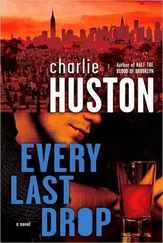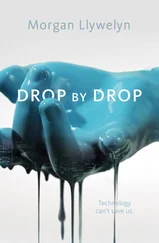“All right,” Joe Bosky spat, “I know when I'm not wanted, don't let the door hit you on the way out, right?” and he started off toward the plane, unsteady on his feet. He hadn't gone five yards before he turned round and focused the glare of his silver shades on Pan, on Ronnie. “You coming,” he said, “or what?”
Ten minutes later, while people milled and debated and groused and Bill pressed a cold wet towel to his face, they heard the plane's engine start up with a sucking roar, as if someone were out there vacuuming off the surface of the river. Then the accelerating whine of the propeller came to them and they looked up to see Joe Bosky's floatplane glide out from shore, catch the current and taxi into the mouth of the trees only to rise a moment later and flare off into the night sky with a single reflective flash of the declining sun. Marco stood there watching it a moment, then took Star by the hand and walked her down through the field of foot-worn flowers and trampled weed to a place where they could look out over the ripples and braids of the current. He eased himself down, and she sat in the gravel beside him. “There goes Ronnie,” he said.
Star drew her knees up and knotted her arms round them. For a moment she said nothing, just seesawed back and forth, her white compact feet beating time to the motion of her body. “He'll be back,” she said.
“You really think so?”
She looked off across the river. It was late, midnight or thereabout. The colors went up in layers, from the scoured tin of the river to the dense black-green of the trees to the pink band of the sun-brushed hills. A sickle moon, pale as ice, sketched itself in over the trees. She cursed and slapped a mosquito on her ankle, then another on the back of her arm. “Really?” she said finally, turning to hold his eyes. “Truly?”
He shrugged, as if it didn't matter one way or the other.
“No,” she said. “I don't think so. I think he's-” There was a catch in her voice and he wanted to rock her in his arms but that catch made him hesitate, made him angry and hateful and jealous. “I think he's gone,” she said. “For good.”
That was when they heard the motor out on the river and they looked up unbelieving, because this had been a day of arrivals and departures, an unprecedented day, nothing like it yet in the brief history of Drop City North-first Bosky and Ronnie, then Verbie, Sky Dog and Dale Murray-and now who was this slashing up against the dark run of the current? They watched as the boat-it was a skiff, flat-bottomed, snub-nosed, like any dozen of them up and down the river-took on color and shape and finally emerged from the dark screen of the littoral and swung into shore fifty feet from them. A stooping, raw-boned figure clambered over the seat from stern to bow, flinging something ashore, a sleek bundle that fell formless to the gravel, and then a pair of scissoring legs splashed ashore and there he was. “Hey, hello there,” he said, stooping to the bundle and pulling himself up out of the fade of light. “Isn't that-?” Star began, and they were both on their feet now, but she couldn't supply the name.
Marco gave back the greeting and the man came toward them, the stripped bones of his face under the long-billed cap, the awkward challenging height of him, and then he knew: it was the one from the bar, from the Three Pup, the one they called Iron Steve.
Iron Steve was in gum boots and a plaid flannel shirt and his hair was slicked tight to his head, and his every step was like a leap, as if the ground were cratered beneath his feet. “Hey, I sure hope I'm not bothering you people this late, but I was, uh, well-I was looking for Verbie. She around?”
Star said sure, she thought so, if she hadn't gone to bed yet, and there was an unspoken question tagged on to the end of it.
Iron Steve raised his right arm and the bundle came with it, stiffened feet and limp naked ears, the sleek jackets of fur-rabbits, he was holding up a string of rabbits on a twisted coil of wire, and all Marco could think of was fish, dark dangling strips of flesh strung through the gills. “I brought these for her,” Iron Steve was saying. “I thought I might surprise her. You know which tent is hers?”
Star gave Marco a look and they were both thinking the same thing, thinking dead meat for a vegetarian? And rabbits-_bunnies__-no less? But then Marco saw the beauty of the equation: Ronnie was gone, gone no more than half an hour, and here was his successor. Subtract one Pan, add one Iron Steve.
“I also brought her this,” Steve said, and he held out his palm to show them a coil of wire and a medicine bottle with what looked to be matches packed inside.
“What is it?” Star asked. It was twilight now, the sun edged down beyond the ridge, the sickle moon brightening. She stood with her legs apart, hands on her hips, and the mosquitoes meant nothing to her though they danced and swarmed and played their thin music over the backbeat of the river.
“This? Oh, this is just a little something I thought she ought to have-in case she gets lost.”
“Gets lost?” Star said.
Iron Steve pulled back his hand, ducked his head. “Oh, yeah,” he said, “everybody gets lost up here, whether it's your plane going down or your tracks getting obliterated in a whiteout or you're just out there chasing after something and you turn around and can't tell one tree from the other.”
“So what is it,” Marco said, “some kind of compass?”
“Oh, hell, no,” Steve said, grinning, and out came the hand again, the palm supinated to display the wire and the thick brown glass of the medicine bottle. “Long's you have wire, you can snare rabbits,” he explained, “and the matches, I dipped them in paraffin myself and sealed them up tight. Because if you keep your matches dry you got yourself a fire to kick back the cold and roast your rabbits-”
Star gave him a blank look. Marco couldn't help but smile.
“You know,” Steve said, “for emergencies.” He kicked a foot in the fan of gravel and studied the slow rotation of the toe of his boot as if it were a divining rod. Then he looked up, grinning still. “Up here we call it living off the land.”
It was the first really brisk day, August tapering off into September, high summer giving way to low fall, and Pamela was alone in the cabin, baking bread in the woodstove in the front room. The recipe was her mother's-3 cups white flour; 1 cup whole wheat flour; 3 tablespoons sugar; 1 teaspoon salt; 2 cups sourdough sponge; 2 to 3 tablespoons melted bear fat (she was using canned butter because as far as she knew the bears were all still alive and well and judiciously carrying their own fat around with them)-and she'd modified it a bit through the ten or twelve times she'd baked here on the Thirtymile, but still, if the stove was hot enough and she had the patience to let the dough rise for two hours or more, she usually got a rich heavy glistening loaf that had Sess pulling the superlatives out of his slow-grinding jaws. Outside, a sky the color of soapstone hung low over the hills. The wind was blowing down out of the northwest, tearing leaves from the trees along the river, fanning the cabbage and lashing at the stiff canes of the Brussels sprouts in the garden. Every once in a while a gust would rattle the windows.
Sess was out in the yard with Iron Steve, who'd stopped by on his way down from the hippie camp. The two of them were splitting wood (Steve as a down payment on the dinner he knew to expect), drinking beer out of Mason jars and keeping an eye on the weather. It looked like rain-or sleet-and if the wind settled there would be frost for sure. Sess had his woodpiles heaped up at the four corners of the garden, ready to generate some heat through the night, because like every tiller of the earth he wanted to extend the growing season as long as possible, and you never knew, you could have a killing frost tonight and then a week or two of Indian summer to follow. He'd grown some champion tomatoes in the greenhouse, Early Girls and Beefsteaks both, and the cherries had run riot till he had to lift a panel off and let them creep out into the world. They'd had butternut squash till it was coming out their ears, and there was plenty more of it ballooning on the vine, and pumpkins too. She'd been canning day and night, stewing beans and tomatoes and zucchini in the big pot on the stove, peas, broccoli, anything that came up out of the ground in the crazy abundance of light. Her herb garden was a jungle in itself, and the root cellar was stacked high with carrots, onions, potatoes, turnips.
Читать дальше












